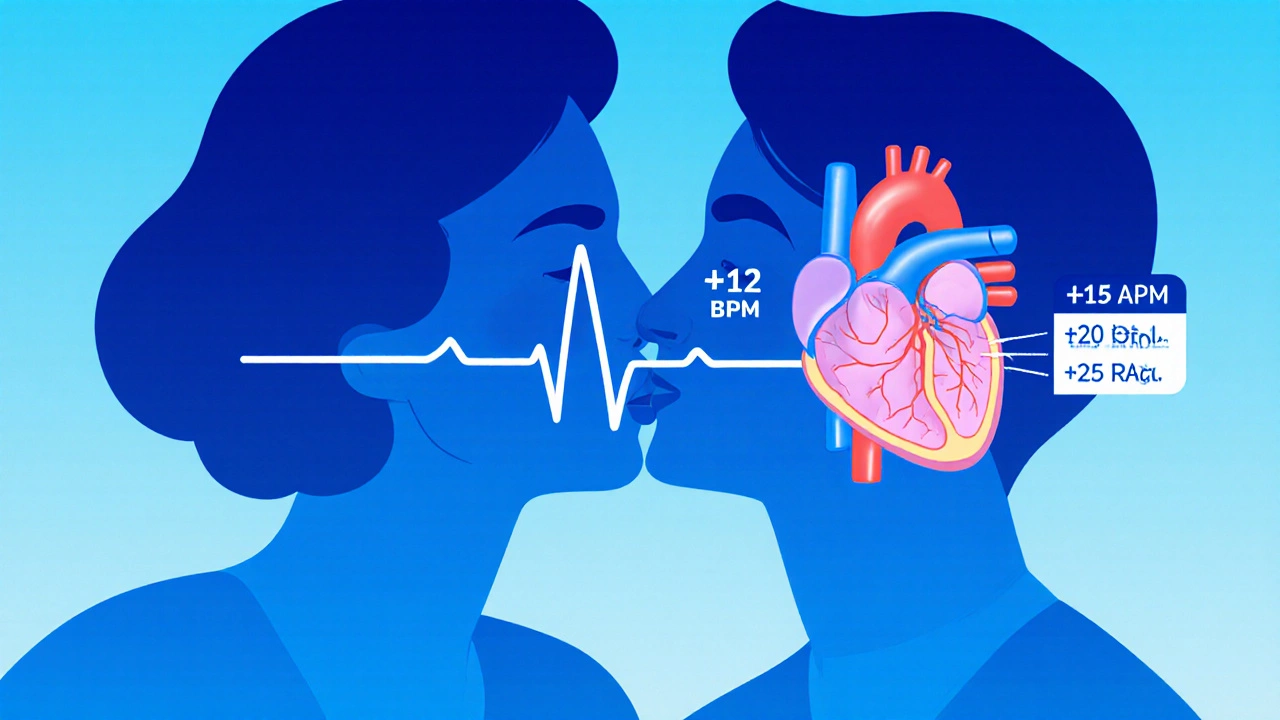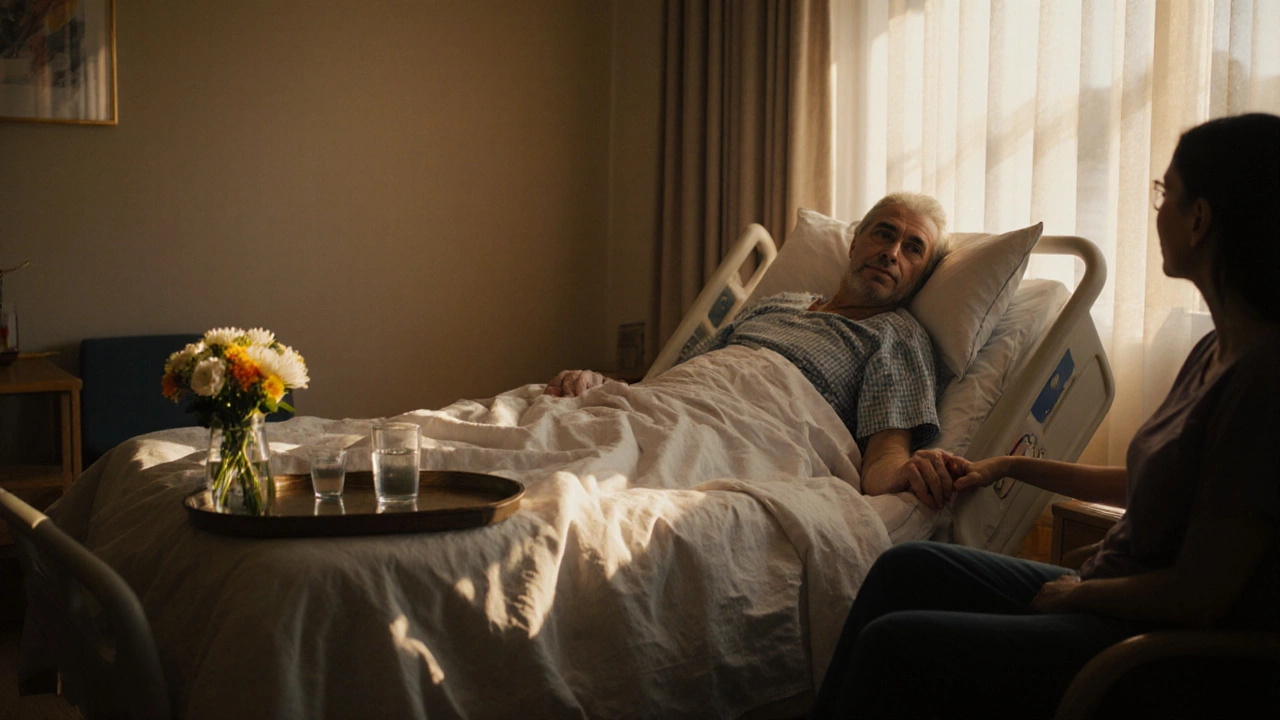Heart Surgery Recovery Calculator
Personalized Recovery Assessment
Your Recovery Status
Heart Rate Impact: Oral sex typically causes 15-25% heart rate increase (similar to light walking)
- Chest pain
- Sudden shortness of breath
- Dizziness or fainting
- Irregular heartbeats
After a major operation on the heart, many people wonder if they can get back to the intimacy they enjoyed before. The question often pops up in the bedroom: oral sex after heart surgery - is it safe, or could it put strain on a still‑healing heart? The answer isn’t a simple yes or no; it depends on the type of surgery, your overall recovery, and how you listen to your body.
What Happens to Your heart during sexual activity?
Sexual activity, whether it’s kissing, cuddling, or oral sex, triggers the same physiological responses as light exercise. Your heart rate rises, blood pressure climbs a few points, and the sympathetic nervous system releases adrenaline. The increase is usually modest - most healthy adults see a 20‑40% jump in heart rate, comparable to a brisk walk.
When you’re fresh from Heart Surgery a procedure that repairs or replaces damaged cardiac tissue, such as a coronary artery bypass graft (CABG) or valve replacement, your heart may not yet handle that extra workload comfortably. The surgical site, sutures, and any grafts need time to settle, and the medications you’re on (beta‑blockers, anticoagulants, etc.) can affect how quickly you bounce back.
How intense is oral sex compared to other activities?
Researchers have measured heart‑rate responses for a range of intimate actions. Here’s a quick look:
| Activity | Average % increase in heart rate | Typical BPM (beats per minute) rise |
|---|---|---|
| Kissing | 10‑15% | +10‑15 BPM |
| Oral sex (giving or receiving) | 15‑25% | +15‑25 BPM |
| Light walking (2‑3 km/h) | 20‑30% | +20‑30 BPM |
| Moderate cycling | 40‑60% | +40‑60 BPM |
As you can see, oral sex sits in the lower‑to‑mid range - it’s more demanding than a simple kiss but far less intensive than a cardio workout. For most patients, that level of exertion is perfectly manageable once the heart has healed enough to tolerate a light walk.
Medical guidelines for resuming sexual activity
Cardiologists follow a step‑by‑step timeline after heart surgery:
- First week: Bed rest and light breathing exercises. No sexual activity.
- Weeks 2‑4: Light walking around the house, gentle stretches, and gradual increase in daily tasks.
- Weeks 4‑6: If your doctor clears you, you can start low‑impact sexual activity - think kissing, cuddling, and yes, oral sex.
- Weeks 6‑12: More vigorous activity may be added, but always check your heart rate and blood pressure first.
- Beyond 12 weeks: Most patients return to their pre‑surgery intimacy levels, provided there are no complications.
The key is that each milestone requires a clear sign‑off from your cardiac team. They’ll usually run a stress test or an ECG to see how your heart reacts to a controlled increase in workload.

Factors that influence safety
Not every heart surgery is the same. Here are the main variables that shape your safe‑return timeline:
- Type of procedure: A straightforward CABG usually heals faster than a complex valve replacement that involves longer cardiopulmonary bypass time.
- Age and pre‑surgery fitness: Younger, active patients bounce back quicker than those with sedentary lifestyles.
- Medications: Beta‑blockers keep heart rate lower, which may make you feel less “pumped” during oral sex. Anticoagulants increase bleeding risk if you experience a cut or sore mouth.
- Complications: Arrhythmias, wound infections, or graft issues prolong the recovery.
- Psychological factors: Anxiety about the heart can raise blood pressure, making even gentle activity feel harder.
Ask your surgeon about which of these apply to you. A personalized plan beats generic advice every time.
Practical tips for safe oral sex after heart surgery
When you get the green light, keep these pointers in mind:
- Start slow: Begin with light kissing and short periods of oral contact. Keep the session under 10 minutes until you gauge how you feel.
- Monitor your pulse: Use a smartwatch or a simple finger‑pulse check. If your heart rate spikes more than 20‑30 BPM above resting, pause and rest.
- Stay hydrated: Dehydration can raise heart rate, so sip water before and after.
- Avoid extreme positions: Lying flat for long periods can increase venous return and strain the heart. A semi‑upright position is gentler.
- Mind the meds: If you’re on a blood thinner, keep oral hygiene tight to prevent gum bleeding.
- Communicate: Let your partner know you’re testing limits. A simple “stop if I feel light‑headed” goes a long way.
These steps help you enjoy intimacy without compromising recovery.

Warning signs to stop immediately
Even with caution, your body may give an alarm. Stop the activity if you notice:
- Chest pain or tightness that lasts more than a few seconds.
- Sudden shortness of breath that doesn’t calm down with a pause.
- Dizziness, light‑headedness, or fainting.
- Heart palpitations that feel irregular or rapid.
- Excessive sweating unrelated to room temperature.
If any of these pop up, sit down, take slow breaths, and call your cardiologist if they don’t fade within a few minutes.
Frequently Asked Questions
Can I have oral sex the day after heart surgery?
No. The first 24‑48 hours are meant for rest, wound care, and monitoring for complications. Any sexual activity, including oral sex, should wait until your surgeon clears you, usually after the first week.
Does oral sex raise blood pressure more than other activities?
It raises blood pressure slightly-about 5‑10 mmHg on average-similar to light walking. For most post‑surgery patients, this increase is safe once the heart can handle a stroll without chest pain.
What if I’m on blood thinners?
Blood thinners don’t affect the heart’s ability to handle oral sex, but they make oral injuries more likely to bleed. Good oral hygiene and gentle techniques reduce that risk.
How long should I wait after a valve replacement?
Most cardiologists advise a 6‑week wait before any sexual activity. The longer recovery period accounts for the more invasive nature of valve work and the need for the new valve to settle.
Is it normal to feel a rapid heartbeat during oral sex?
A mild increase is normal. If your heart rate climbs beyond 120 BPM or you feel uncomfortable, pause and breathe deeply. Consistent high rates warrant a check‑up.
Bottom line: oral sex isn’t off‑limits after heart surgery, but treat it like any other light exercise. Follow your doctor’s timeline, listen to your body, and keep communication open with your partner. With those steps in place, you can safely enjoy intimacy while your heart heals.
